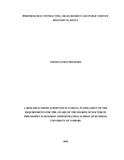| dc.description.abstract | Improvement in public service delivery and the consequent increase in customer (public) satisfaction with public services have been at the core of reform programs in many developed and developing countries. The issues of performance contracting, measurement and evaluation are not new phenomena; governments have persistently sought to justify their existence based on their achievements in service delivery to their citizens. The general objective of this study was to establish the relationship between performance contracting and measurement and public service delivery in Kenya, as intervened and moderated by, respectively, political stability and global competitiveness. The concepts of performance contracting, measurement and service delivery are grounded in, and indeed straddle a number of theories that embrace and give credence to these precepts. These theories include theory of Performance, theory of organizational performance management (OPM), theory of Change and Resource-Based Theory of Competitive Advantage. This study was guided by positivist philosophy. The positivist school of thought is based on the assumption that only one reality exists, though it can only be known imperfectly due to human limitations and researchers can only discover this reality within the realm of probability. This study employed a cross-sectional design focusing on the entire population of 470 MDAs. The study relied on secondary data that was already available. The political stability indices were extracted from the World Bank Report on Worldwide Governance Indicators on Political Stability and Absence of Violence/Terrorism, while the data on global competitiveness was obtained from the 2013 World Economic Forum (WEF) report of the World Bank. Further, the various categories of MDAs had, by 2010/11, been on performance contract for differing periods; these are 6 years for both ministries and state corporations, 5 years for local authorities and 4 years for tertiary institutions. The data used for the study was in respect to the five years of 2006/07, 2007/08, 2008/09, 2009/10 and 2010/11, during which period customer satisfaction in the majority of the above categories of public agencies was measured. Descriptive analysis was conducted to bring out the main characteristics of the sample. To test the hypotheses, correlation and regression analyses were carried out to establish the expected relationships between performance contracting and measurement, and public service delivery in Kenya, and the intervening and moderating effects of, respectively, political stability and global competitiveness, on this relationship. In addition, t-test and p-values were used to determine individual significance of the results of the analysis. Assessment of the overall robustness and significance of the regression models was done using the F-test and p-values. Based on the research findings, it can be concluded that performance measurement has a significant effect on customer satisfaction. Secondly, it can be concluded that political stability has an intervening effect on the relationship between performance measurement and customer satisfaction. Further, global competitiveness has a moderating effect on the relationship between performance measurement and customer satisfaction. The outcome of this study is expected impact on a broad spectrum of constituents, among them governments desirous to improve public service delivery, practitioners and academicians in the field of performance measurement and public service delivery, managers of public sector institutions, individual public sector employees and the public, who are the beneficiaries of government services. The study findings reveal a number of questions that still need to be addressed. It will be recalled, for example, that the study established that performance measurement explains 73.6 percent of customer satisfaction levels. Political stability explains 1.8 percent while global competitiveness explains 2.5 percent. The three variables explain 78.5 percent of customer satisfaction levels. Further research is required to establish what other factors could explain the remainder of the customer satisfaction level that was not explained by the above variables. | en_US |



